FAQ
Frequently asked questions about contract and license management
What exactly constitutes Contract Metadata?
Contract metadata in Zluri includes details like contract name, type, owners, start and end date of the contract, description, vendors, etc.
How do we differentiate different license terms, such as number of users or number of emails, besides the common ones like spending, and show only the ones relevant to that application’s contract or subscription?
Each application with a contract uploaded displays the licenses available to that particular app. With respect to the users mapped to each license, we show the number of users against the licenses assigned to them. If a single user possesses multiple emails (as aliases) in Zluri, we consider that as a single licensed user for that application and not two licensed emails.
How does auto-increment work in metric-based licenses?
Auto-increment works only for seat-based licenses. This is because these licenses can be assigned only to users, which does not happen with metric-based licenses.
How’s the cost of the contract calculated?
Cost of the contract is the sum total of the cost per licenses and license term, along with any base price and one-time fees minus the discounts that have been entered while uploading the contract into Zluri.
How does Zluri get the license information?
Zluri gets the license information for a particular app through direct integration. The APIs pass on the license data, for ex: which license is assigned to a particular user. In case there isn’t a direct integration for a specific application, licenses can also be uploaded manually and mapped to users individually, or they can be uploaded and mapped to users using the Bulk upload feature.
What is the difference between User-based license vs Quantity based licenses:
User-based contracts are contracts which are billed on the number of users. User-based licenses can be assigned to a user. In user-based contracts, you will usually find the number of users to the licenses in a particular contract that can be assigned.
Quantity-based Contracts: here, you are billed based on a specific metric or quantity, for example, the number of emails sent, the number of messages sent etc. Quantity-based licenses cannot be assigned to a user.
How is the cost for an Individual License calculated?
In case the vendor is charging a base fee:-
The base fee is the amount the software vendors charges, including a certain number of licenses. Any more licenses beyond this number are charged separately.
Thus, while entering the particulars of such a license, it is essential to check the ‘I am being charged a base fee’ option. The number of licenses covered in the base fee should be mentioned in the relevant field. After this, the total number of licenses bought should be entered in the relevant field along with additional information like discount, term and quantity. These data points enable Zluri to calculate the right amount.
In case there is no base fee charged by the vendor:-
The user would be required to enter data for essential fields like quantity, discount (if any)
Why is there a difference between "Cost" and "Spend"?
Zluri gives you two metrics to monitor cost for any contract.
Cost: Obtained from the contract value
Spend: Obtained from the actual transactions.
Let's say a 12 month contract is starting from 01-Jan-2022 uptill 31-Dec-2022 for 100 users at a cost of $3 per user. The cost for the month of January gets calculated as $300. Now let's say there are additional 20 users for which license is purchased in the month of March. Cost for the month of March is calculated as $60. Similarly if there are 30 more users added in the month of September, The cost for September is calculated as $90.
The spend is not calculated as such. It is the actual spend for the particular app as recorded in the transaction csv or financial systems.
What is the difference between the "Discount on a line item level" and the discount entered to the "bottom of the license" addition screen?
As we see, there are two provisions to add a discount :
1. Line Item Level
2. On contract level.
The discount on a line item level only applies to that specific line item or license. The discount given at the bottom of the license addition screen applies to the entire contract and applies to all the licenses under that contract.
How does Zluri calculate Cost?
Let’s consider a 12-month contract that runs from January 1, 2022, to December 31, 2022, covering 100 users at a cost of $3 per user. For January, the total cost will be $300.
In March, the organization purchases licenses for an additional 20 users, bringing the total cost for that month to $360.
Later, in September, the company adds 30 more users. As a result, the cost for September will rise to $450.
How is the usage calculated for the Quantity-Based licenses?
Zluri calculates usage only for user activities on an application, which is not applicable for quantity-based licenses.
How do we assign Licenses?
For some context, there are two types of licenses -
1. User Based2. Quantity Based
Only User Based licenses can be mapped to the users, read about User Based and Quantity Based licenses in the FAQs.
There are two ways to map licenses to users on Zluri. You can either individually assign licenses to each user or Bulk Assign Licenses to multiple users by uploading a sheet.
Individually Assigning Licenses
Step -1: Navigate to the Applications Panel and Select an application. (e.g. Google Workspace)
Step -2: Navigate to the Users tab for the selected application.
Step -3: Go to the License Column, click Add License, and select the license you want to assign to the User.
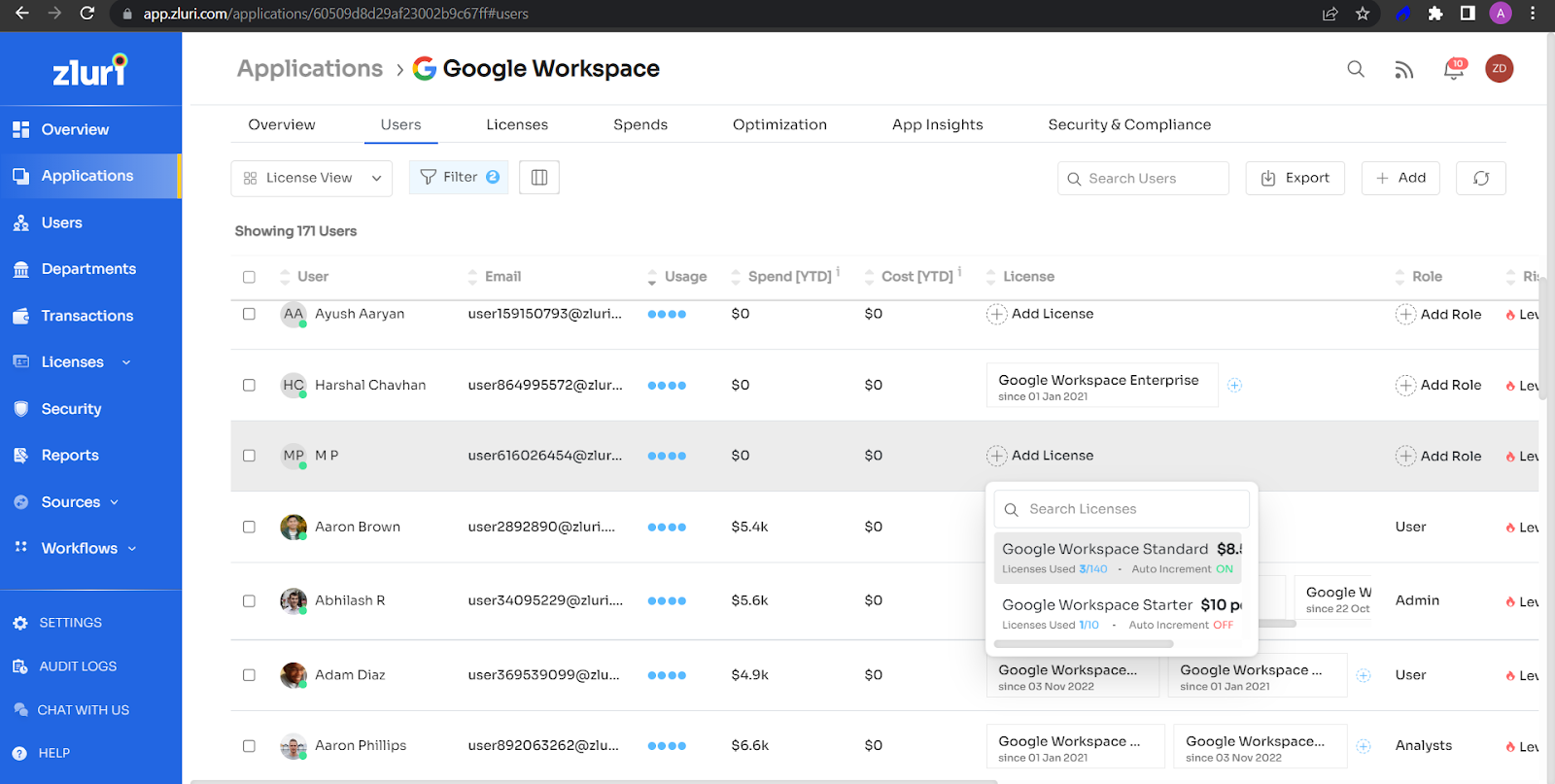
Bulk Assigning License :
Step -1: Navigate to the application you want to assign the licenses for.
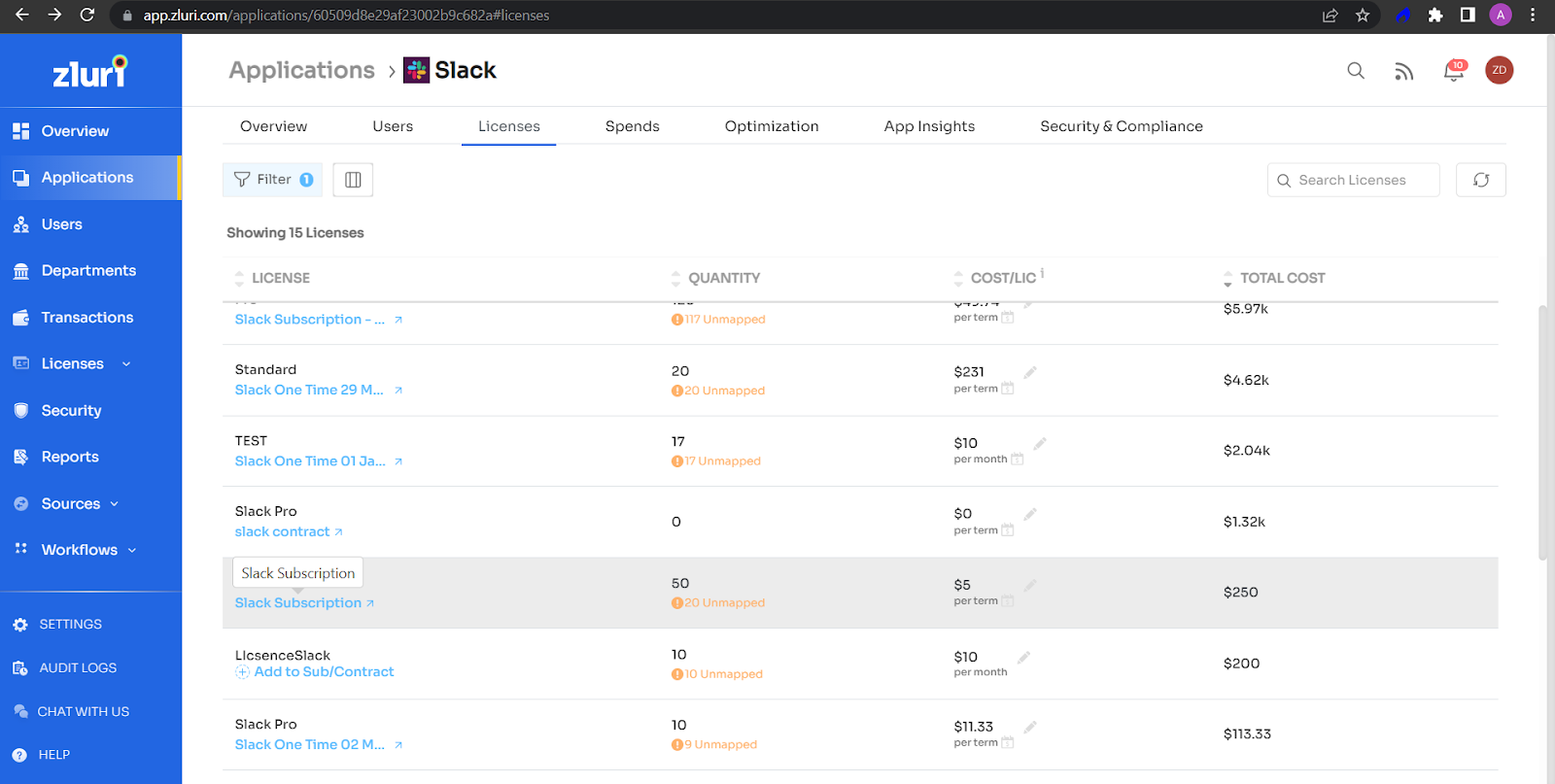
Step -2: Select the Subscription/License you want to assign the users to.
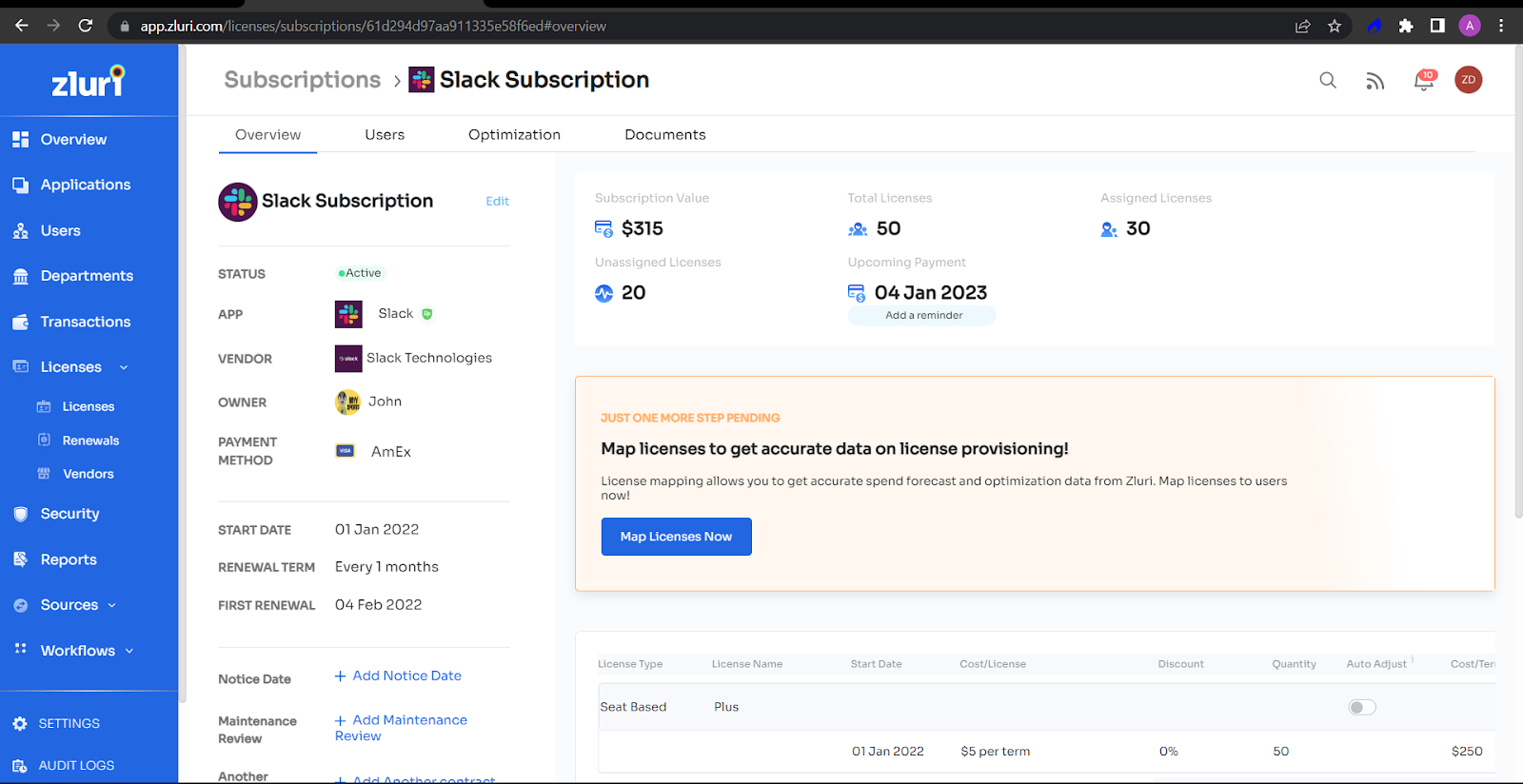
Step -3: Click on “Map Licenses Now” to Bulk map the license to the users.
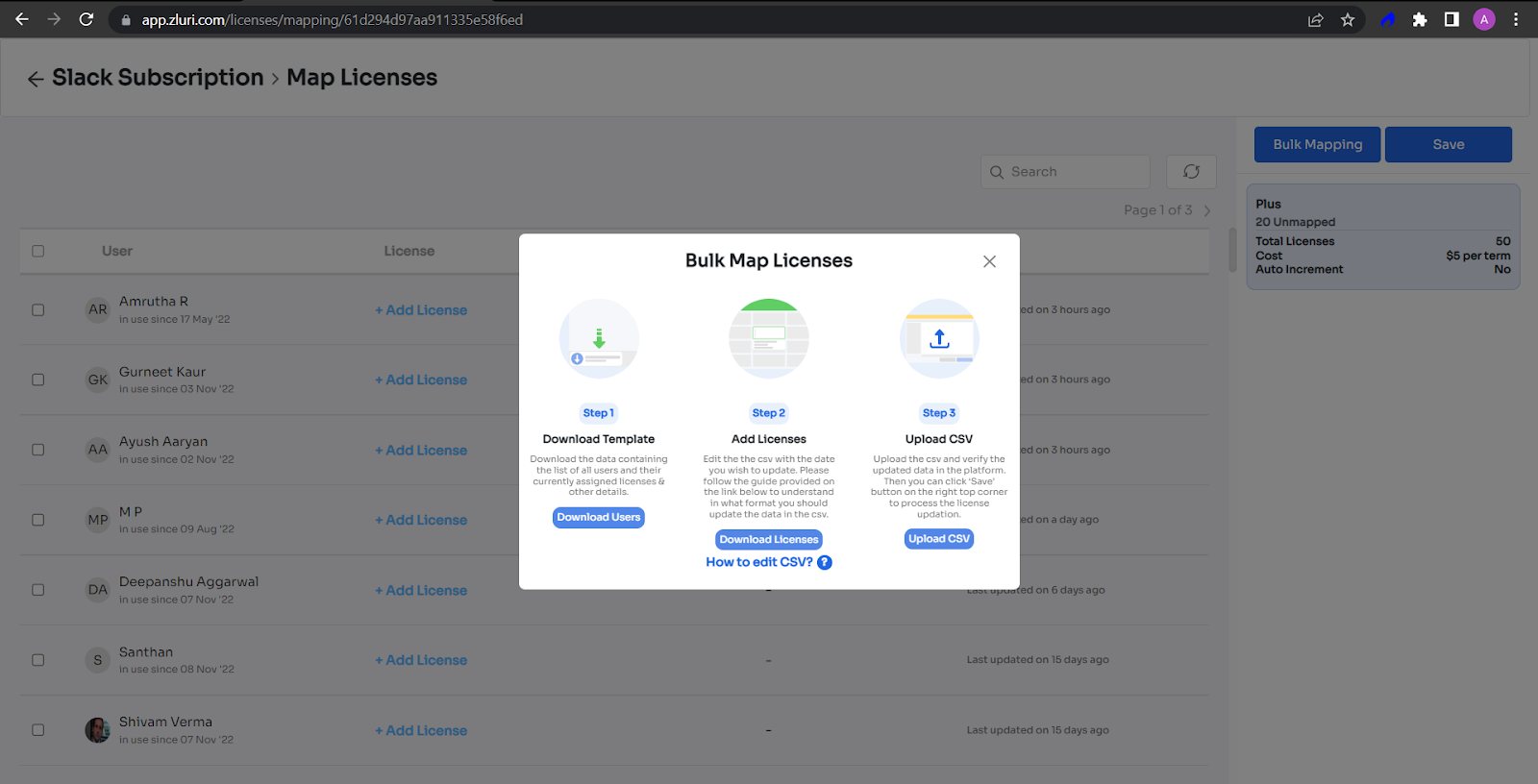
Step -4: Follow the Prompts to Download the CSV. Fill the sheet in the downloaded format, and upload it back on the platform to Bulk map all your licenses.
What are the two methods we accept licenses on Zluri?
The two methods we accept licenses on Zluri are as follows:
- User-based licenses - These are the licenses that are subscribed per user for a period of time.
- Quantity - These are the licenses that are subscribed for a quantity-based product like SMS apps offering plans with N number of messages, marketing apps offering plans with N number of campaigns etc.
NOTE: Generally, user-based licenses can be mapped to users, whereas quantity-based licenses can’t be.
Do we also add perpetual and subscription costs to contract costs? If so, why is it still termed as contract cost?
We calculate these costs every month for all types of contracts. We calculate the subscription cost for the next payment term and the perpetual costs for the next financial year. But since a contract is a generic term, we use it for all kinds of contracts.
How do I add a custom reminder for contract renewals?
To add a custom reminder, Go to licenses, choose contracts, select a contract and add a reminder.
You can add a reminder for the End date or next payment.
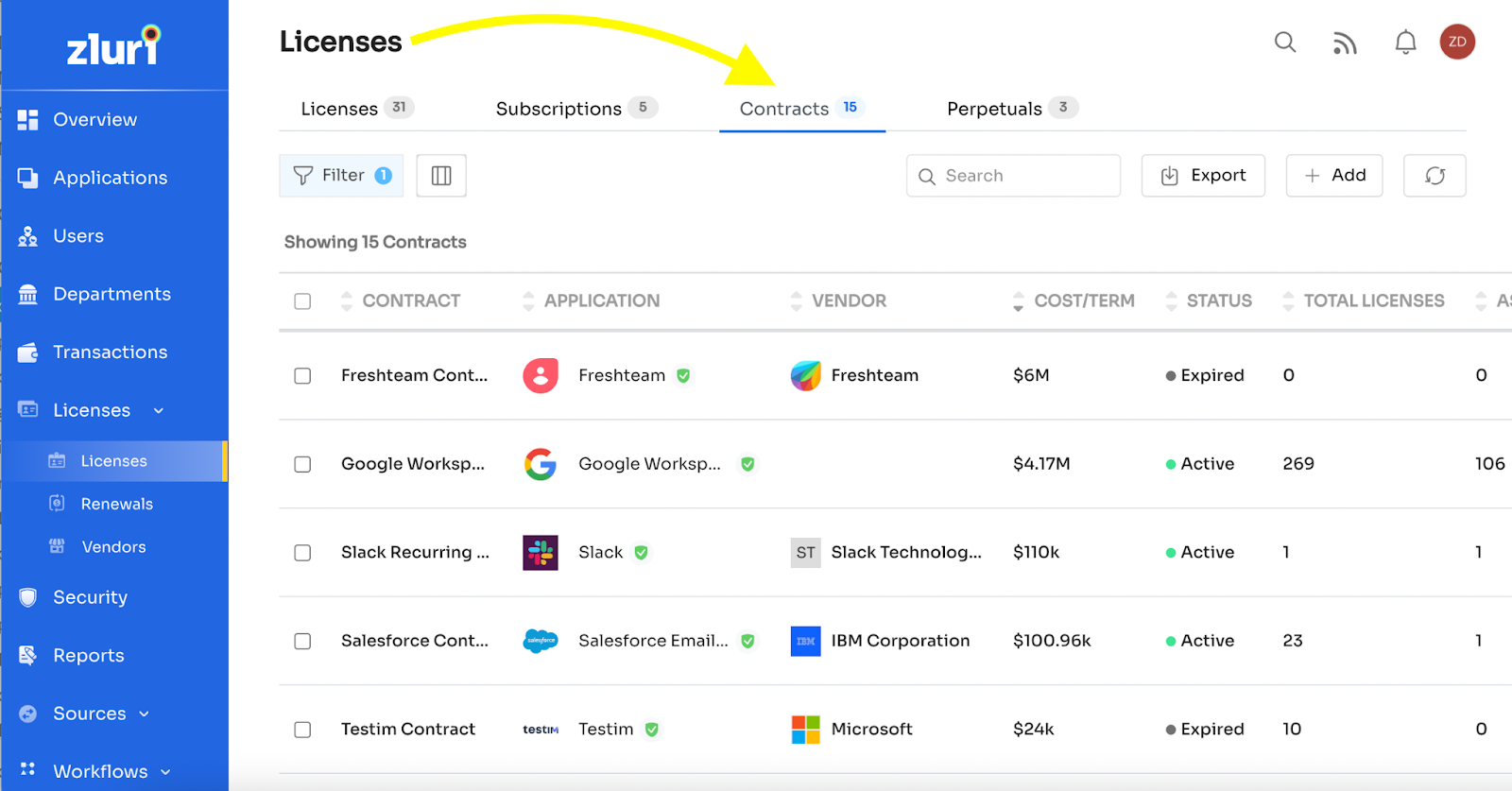
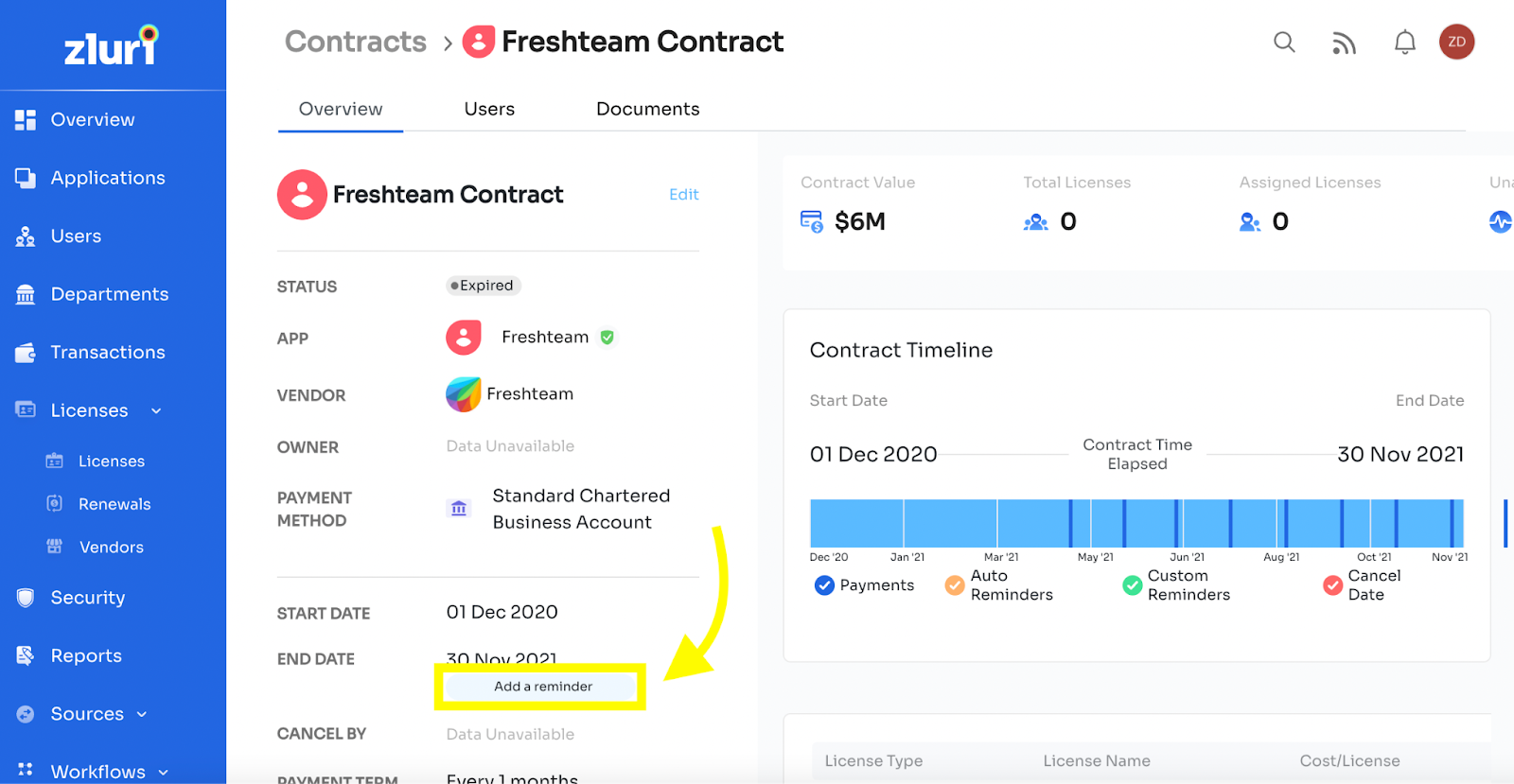
Who receives the License/ Contract related notifications?
-
Payment renewal due in x days (E015):
-
App Owner, App IT Owner, App Finance Owner, Finance Admin, Contract Owner, Contract IT Owner, Contract Finance Owner
-
Upcoming renewals due next month:
-
Template Owner, Admin, IT Admin, Payment Owner, Procurement admin
-
Renewal due in x days:
-
App Owner, App IT Owner, App Finance Owner, Finance Admin, Contract Owner, Contract IT Owner, Contract Finance Owner
-
Contract end date reminder:
-
App Owner, App IT Owner, App Finance Owner, Finance Admin, Contract Owner, Contract IT Owner, Contract Finance Owner
-
Contract cancel by a reminder:
-
App Owner, App IT Owner, App Finance Owner, Finance Admin, Contract Owner, Contract IT Owner, Contract Finance Owner
-
License utilization - 80%:
-
Admin, App Owner, App IT Owner, App Finance Owner, Contract Owner, Contract IT Owner, Contract Finance Owner
Updated 6 months ago
